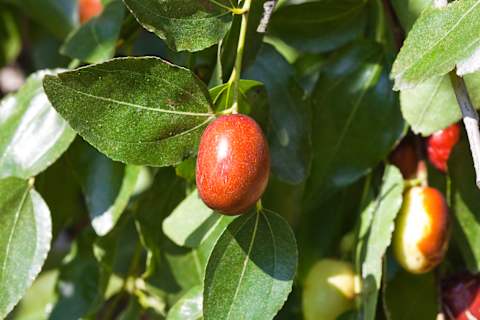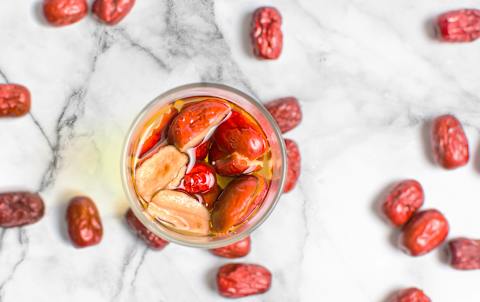Advertisement

You've probably been downing plenty of salmon, berries, and green smoothies in the name of good health. Maybe even a couple of adaptogenic herbs and mushrooms for good measure and stress relief. But there's a funky-sounding fruit that may deserve a place in your wellness repertoire that you've probably never heard of: jujube fruit (Ziziphus jujuba), aka jujube date, red date, or Chinese date.
What are jujube fruits, dates, and trees?
Juju-what?! Although many of us in the Western world haven't heard of the jujube, the fruit, seeds, and bark of this plant have been widely used as food and in Traditional Chinese Medicine for 3,000 years1 to help calm the mind and relax the body, among other things. And while research isn't conclusive (rigorous clinical trials are lacking), some preliminary studies on the fruit, fruit extract, and seed extract do suggest these relaxation benefits are real and that jujubes offer additional perks, like improved digestion and cancer-fighting properties.
Even better, jujube fruit is legitimately tasty. Fresh jujubes, which come from the small deciduous jujube tree, are oval-shaped drupes—fleshy fruits with thin skin and a central stone—that taste similar to a very sweet apple. Mature dried jujubes, on the other hand, are often referred to as jujube dates, as they're dark brown and wrinkly with a flavor similar to regular dates. Jujubes can also be brewed into a mildly fruity tea.
Intrigued? There's good reason to consider adding this healing food to your diet, especially if you suffer from stress or anxiety. Here's a comprehensive rundown of jujube benefits, where to find them, and how to eat them.
Jujube benefits: A nutritional breakdown.
Jujube fruit nutrition will vary depending on the specific cultivar (there are hundreds!), but they are all relatively high in carbohydrates, with about 20 grams of carbs per 100 grams of fresh jujube fruit—about 5 grams less than a medium apple. The same amount of fruit will fulfill your quota for vitamin C, clocking in at 115 percent of your daily value (while 100 grams of dried jujube dates contains just 20 percent). Jujubes also contain a wide variety of minerals, including potassium, phosphorus, manganese, calcium, iron, and zinc. And both jujube fruit and seeds contain the antioxidant phytochemicals flavonoids, saponins, and polysaccharides2.

Health benefits of jujube fruit.
As mentioned above, rigorous clinical trials of jujube fruit (and extract) consumption by humans are lacking, but preliminary research does suggest this fruit packs a serious health punch. Here are a few ways it could help:
1. Promote high-quality sleep.
Jujube tea has long been used in Chinese herbal medicine to promote sleep and ease insomnia. Which makes a lot of sense, since the flavonoids and saponins present in both jujube fruit and seeds have been shown to have calming properties. In fact, one study2 found that these two phytochemicals, extracted from jujube seeds, had sedative effects in mice, which prolonged sleep time. Gaia Herbs features jujube date fruit in their SleepThru supplement, along with other calming herbs such as passionflower, ashwagandha, and magnolia. Robert Roundtree, M.D.—an integrative medicine physician and speaker at revitalize 2018—loves jujube and has prescribed it for many years for patients with sleep problems explaining, "It's the best thing going for enhancing the quality of sleep. One thing I particularly like about this herb is that it is also a food that is very gentle and doesn’t knock people out or cause hangovers the morning after taking it."
2. Ease anxiety and stress.
For the same reasons that jujubes can promote good sleep, they can also help ease anxiety. But the key to reaping jujube's soothing properties without experiencing the sedative effects comes down to the dose. One study3 found that jujube seed extract has anti-anxiety effects in mice at lower doses and sedative effects at higher doses. While you're not going to knock yourself out by consuming a few fresh jujubes or jujube dates, teas and supplements do contain more concentrated levels of these calming compounds, so always start slow and see how your body reacts.
3. Provide a natural glow.
As mentioned above, fresh jujube fruit is sky-high in vitamin C. And that's great news for your skin. Not only does vitamin C help protect skin from damage from solar radiation4, it also plays a crucial role in the production of collagen, that fibrous protein that forms connective fibers in tissues and has been shown to improve skin elasticity5 and overall hydration6.
4. Improve digestion and cure constipation.
Teas, soups, and purees made from jujube fruit have traditionally been used to promote healthy digestion. A study7 that examined the effects of a jujube extract on hamsters found that it sped up gastrointestinal transit time; decreased the amount of ammonia in feces, reducing intestinal exposure to toxic compounds; and increased the concentration of short-chain fatty acids, which may help improve the overall health of the gut8. Another study9, this one on humans, found that an extract of jujube helped ease constipation compared to a placebo.
5. Possess cancer-fighting properties.
As mentioned, jujubes contain phytochemicals called flavonoids—potent plant compounds that have been well-studied for their link to fighting cancer. Both lab and epidemiological studies suggest that flavonoids reduce the risk of a variety of cancers, but a research review10 found that the strongest evidence existed for colorectal and breast cancers. Flavonoids may work in part by reducing inflammation and inhibiting the proliferation of cancerous cells. And while this 2008 study11 didn't specifically implicate flavonoids, it did find that a jujube fruit extract helped induce apoptosis (automatic cell death) and suppress the growth of human tumor cells in the lab.

Potential side effects of jujube.
No common side effects of jujube have been reported, and it's likely relatively safe if consumed as a food. However, if you choose to take it as an extract in supplement form, you should always check with your health care provider about potential interactions, especially if you're dealing with any sort of health condition. There's been one reported interaction of jujube with the drug venlafaxine, which is used to treat depression and social anxiety disorder. Jujubes may also lower blood sugar if consumed in large amounts, making it important to monitor blood sugar levels closely if you have diabetes.
Where to find (and how to eat) jujube fruit.
Fresh jujube fruits can be hard to find in U.S. grocery stores, but they do exist here—in fact, they grow particularly well in Texas and can frequently be found at farmers markets in warmer Southern states. If you live farther north, you'll have the best luck in Asian markets. Fresh jujubes should be smooth and unblemished and may range from a greenish-yellow color to a darker brown. Their fruit can be used in any recipe that calls for apples. Try slicing one up and adding it to a salad, or even whip them into a batch of jujube butter this fall.
Dried jujubes, or jujube dates, are easier to get your hands on. In addition to Asian markets, they're readily available to purchase online. Use them any way you'd use typical dates—blended into a smoothie for sweetness, stuffed with goat cheese, or simmered into a jujube tea. To make your own tea, simply combine a pound of jujube dates, a gallon of water, and a few slices of ginger in a large pot and simmer up to four hours. The result is mildly fruity with a hint of spice.
The bottom line on jujube.
Dried jujube dates and fresh jujube fruit taste great and possess a wide range of promising health perks, with minimal to no side effects. More studies are needed to truly establish jujube's healing potential, but as long as you're consuming this food in moderation—and always checking with your doctor before you choose to take it via a supplement—there's no real reason not to give it a try.
11 Sources
- https://www.ncbi.nlm.nih.gov/pmc/articles/PMC5478819/
- https://www.ncbi.nlm.nih.gov/pubmed/17479419
- https://www.ncbi.nlm.nih.gov/pubmed/10996283
- https://www.ncbi.nlm.nih.gov/pubmed/9204949
- https://www.ncbi.nlm.nih.gov/pubmed/23949208
- https://www.ncbi.nlm.nih.gov/pubmed/26362110
- https://pubs.acs.org/doi/abs/10.1021/jf072664z
- https://www.ncbi.nlm.nih.gov/pmc/articles/PMC3735932/
- https://www.karger.com/Article/Abstract/190975
- https://www.ncbi.nlm.nih.gov/pubmed/22888839
- https://www.ncbi.nlm.nih.gov/pmc/articles/PMC2259261/
Watch Next
Enjoy some of our favorite clips from classes
Enjoy some of our favorite clips from classes
What Is Meditation?
Mindfulness/Spirituality | Light Watkins
Box Breathing
Mindfulness/Spirituality | Gwen Dittmar
What Breathwork Can Address
Mindfulness/Spirituality | Gwen Dittmar
The 8 Limbs of Yoga - What is Asana?
Yoga | Caley Alyssa
Two Standing Postures to Open Up Tight Hips
Yoga | Caley Alyssa
How Plants Can Optimize Athletic Performance
Nutrition | Rich Roll
What to Eat Before a Workout
Nutrition | Rich Roll
How Ayurveda Helps Us Navigate Modern Life
Nutrition | Sahara Rose
Messages About Love & Relationships
Love & Relationships | Esther Perel
Love Languages
Love & Relationships | Esther Perel


















